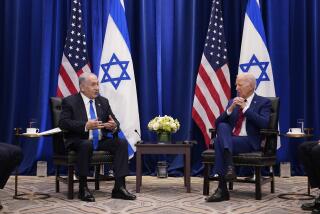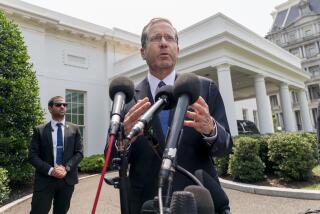U.S. Links Soviet Trade Status to Visas for Jews
- Share via
WASHINGTON — The Bush Administration said Thursday that it will move to extend most-favored-nation trade status to the Soviet Union only after Moscow enacts and puts into place its new plan to ease restrictions on emigration by Soviet Jews.
The clarifications came in the wake of a statement Thursday by Commerce Secretary Robert A. Mosbacher that the move could come “within the next one to three months.” Mosbacher offered the guess during a television interview, but aides later backed away from that estimate.
They said that President Bush wants to wait until the Soviets not only have changed the legal requirements for emigration but also have issued enough exit visas to demonstrate that they are serious about carrying out the spirit of the new law. That could take until next summer.
U.S. law also requires that the two countries work out a trade agreement before the Administration can restore most-favored-nation benefits to the Soviet Union, U.S. trade officials said. A Soviet delegation, meeting with Mosbacher, agreed Thursday to preliminary explorations.
Separately, the Administration appeared to soften its tone on another key trade issue with the Soviets--whether the United States would drop its opposition to Soviet membership in the General Agreement on Tariffs and Trade, the Geneva-based organization that administers world trade rules.
Until recently, Washington had flatly refused even to consider Soviet membership in GATT. It contended publicly that the way the Soviet economy works would not be compatible with GATT rules, which are based on market economies.
Although officials insist that the U.S. position has not changed, senior Administration officials reportedly were somewhat more flexible in discussions with the Soviets on Wednesday and Thursday, saying that Washington would not be able to consider such a move soon.
The softening of the U.S. tone was seen as another response to the Soviets’ economic reforms and not as any indication that the Administration will soon endorse Soviet membership in the 97-country group.
The statements by officials were designed to quell speculation raised by Mosbacher’s comments that Bush may announce the action during his meeting with Soviet President Mikhail S. Gorbachev Dec. 2-3 in the Mediterranean near Malta.
The White House has insisted repeatedly that the two men will not make any major decisions during the summit.
Approval of the trade privileges would be an important symbolic milestone in the improving U.S.-Soviet relationship, putting Moscow on the same trade footing as the United States’ Western allies and other trading partners.
More to Read
Get the L.A. Times Politics newsletter
Deeply reported insights into legislation, politics and policy from Sacramento, Washington and beyond. In your inbox twice per week.
You may occasionally receive promotional content from the Los Angeles Times.










